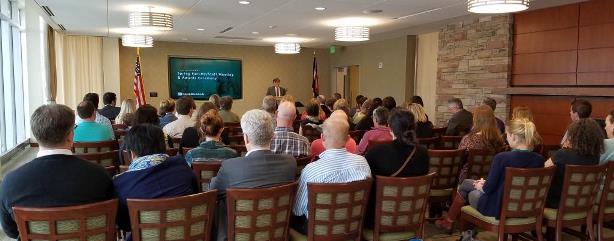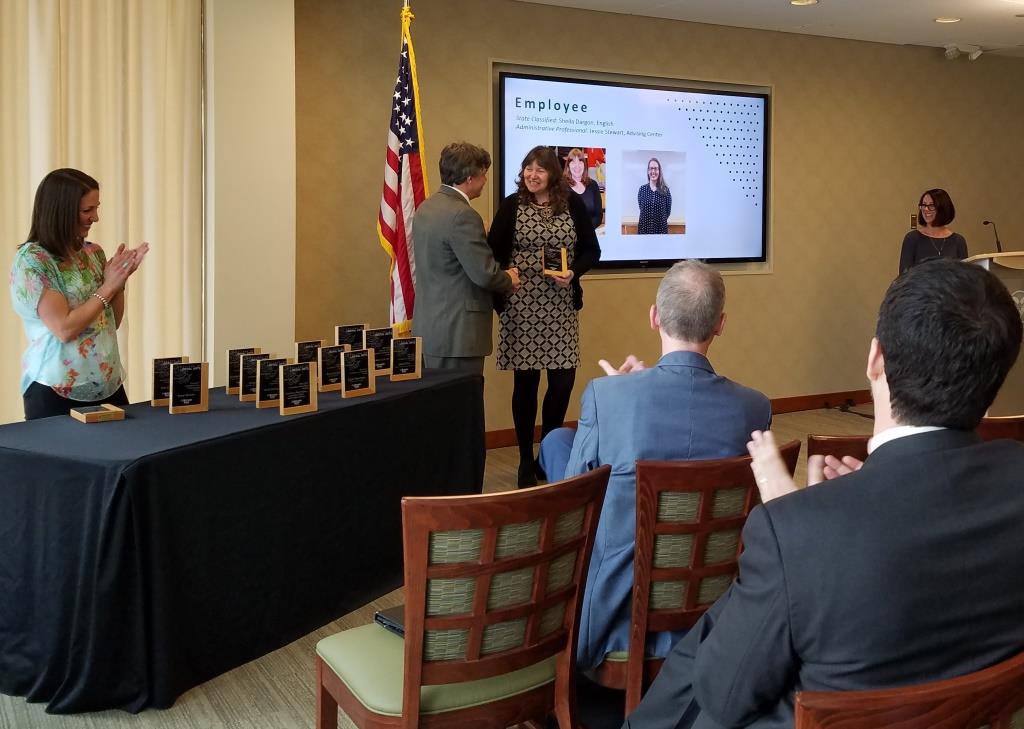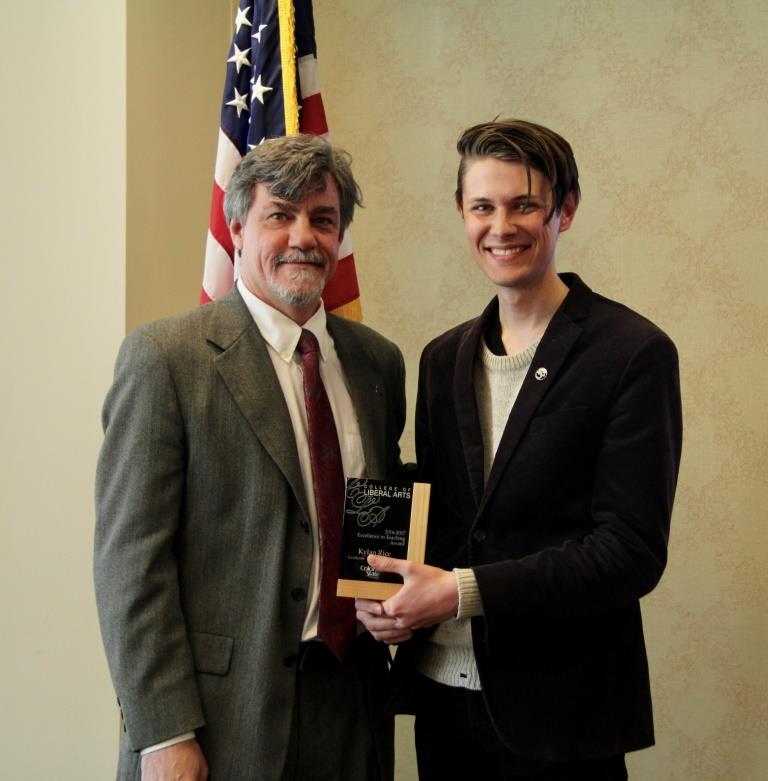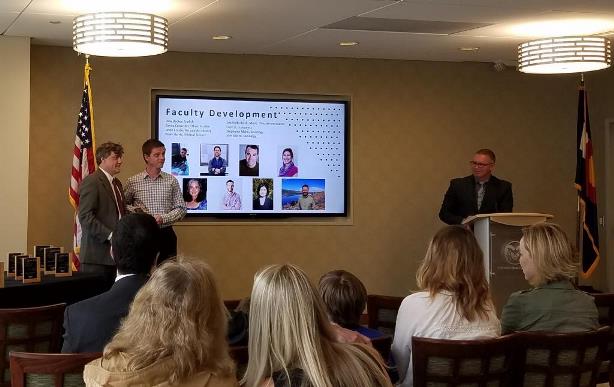
Recently, the College of Liberal Arts (CLA) held their annual awards ceremony. Five members of the English department were honored. Sheila Dargon received the State Classified Award, Zach Hutchins and Kylan Rice were awarded for Excellence in Teaching, Tony Becker was presented with the Faculty Development Award, and Bruce Ronda was presented with the John N. Stern Distinguished Professor Award.
When presenting the CLA State Classified Award to Shelia Dargon, Roze Hentschell said,
The College of Liberal Arts State Classified Award recognizes outstanding contributions and achievements by state classified employees. This year, the award goes to Sheila DArgon, who has been with the Department of English for the last 10 years. Sheila’s nomination letter celebrates her exemplary leadership in supporting faculty and students to ensure their success. She anticipates problems before they manifest, can handle a crisis with composure, and is a careful listener who guides students to make the best decisions about their academic careers and helps them feel welcome, comfortable and confident. She is the first point of contact for all students who come to the third floor of Eddy (thousands of students, since all Composition students come that way as well) and a fine example of the excellence of State Classified employees. Congratulations, Sheila!

Sheila Dargon
Undergraduate Program Assistant
What brought you to CSU?
I moved to Fort Collins in 2005. My sister and her family had lived here for years and I needed to start over, so I came out here and started working for a temporary agency while applying for jobs everywhere! I remember when filling out the application for a job here at the University, that I really liked the energy of being on campus, and thought it would be a great place to work. I actually got the offer from the English department on the day I would have been hired by the company I was temping!
What’s your favorite thing about working in the English Department?
My favorite thing about working in the English department is that every day is different. Some days I see and speak to a lot of students and faculty, and the next, I am working on the computer.
What’s one thing you’d like students in the English Department to know about you?
I want English students to know that I’m here to help and really want them to succeed here at CSU.
What’s your secret? By which I mean: what makes you so good at keeping track of so much information and so many people?
I have no idea, I guess when you like what you do and the people you work with, it makes it easy.

The Excellence in Teaching Award recognizes one outstanding teacher in each of the following categories: Tenured Faculty, Tenure-Track Faculty, Special & Temporary Faculty, Graduate Teaching Assistant.

Zach Hutchins
Assistant Professor of English: Literature
Professor Zach Hutchins received the Excellence in Teaching Award for his hard work as a tenure track with the English Department since joining in 2013.
Associate Dean for Faculty and Graduate Studies Bruce Ronda introduced Hutchins’ award, calling him a “curricular innovator, brilliant scholar, dynamic classroom presenter, mentor and role-model” who is known for his “witty, relaxed and deeply informed teaching.”
From faculty to student support, Hutchins has made an impact within our own English Department. Bruce reminisced that his colleagues praised his “ease in front of the class “and his “invite interaction” coupled with “evident joy in teaching the class.”
But first person testimonials from his students speak louder than those. Bruce explained that these students “drew the attention of the Committee on the Liberal Arts.” One student said “Professor Hutchins is a no-brainer when it comes to being recognized as an excellent teacher in the College of Liberal Arts, and I’m all too happy to officially give him my personal seal of approval.”
This award will not slow Hutchins down. We were able to ask him a few questions about his time in the English Department and how he plans to continue doing what he’s doing.
What has been the most rewarding moment(s) at the English Department, or in Eddy?
I think my most rewarding moment here at CSU came in the spring of 2016, when students from my fall 2015 senior capstone course, “Your Success Story,” emailed me to say that assignments completed in the course had helped them secure the dream job they had targeted. I love to see student work find a second life, outside the classroom.
Do you plan on working on any projects this summer?
I’ve got too many projects this summer, but the most exciting is an essay on Herman Melville’s epic poem Clarel that will take me to London in June, for the International Melville Conference.
Who (or what) had the greatest influence on your career path?
Probably a high school teacher who was willing to talk books (and play chess!) with me after school—not just during class hours. He helped me see that literature mattered and that teacher/student interactions could be more meaningful than an exchange of paperwork.
In one word, how would you describe Eddy/the English department?
Energizing!

The Faculty Development Award, presented to Assistant Professor Tony Becker, provides support for outstanding research and/or creative activity, and is funded by participants in the Great Conversations Speaker Series.
Tony Becker
Assistant Professor, English: Applied Linguistics and TESL/TEFL
What do you enjoy most about working in the English Department or Eddy?
Without a doubt, I enjoy working with our students. That is why I entered into this profession: to engage with students, to create knowledge together, and to strengthen the notion that they can make meaningful contributions to our world. I thoroughly enjoy the fact that we have relatively small (i.e., manageable) class sizes whereby we can interact very closely with our students and work with them to make connections between what we learn and what we experience out in the world beyond the classroom.
Also, it would be an understatement to say that I really enjoy the colleagues that I work in the English department. I have only been here at CSU for five years, but I have interacted with enough units across campus to know that the faculty and staff in the English department are among the most caring and collegial people at CSU. There is an incredible sense of community among many of the faculty and staff, and that resonates throughout our department, even to our students. It is easy to come to work when you know that your colleagues are genuinely interested in the happenings of your life and are willing to listen to what you have to say.
How do you plan to spend the summer? Is there a new project you’re excited to start?
Not surprisingly, I like my summers to be as stress-free as possible. I am hoping to devote a bit more time to getting outdoors with my wife and son, and just being more active in general (more than I typically am during the semester). We will take a short trip to the Gulf of Mexico this summer – nothing quite like the beach in the summer. I also like to do some hands-on projects when the semester finishes up. This summer, I am planning to replace the gutters on our house – how exciting, right!
In terms of my work, much of my summer will be spent on writing up my most recent research project. I am currently working on a project that examines the decisions that ESL students (approximately 50-75) make as they participate in a series of activities used to assess their writing (e.g., developing a scoring rubric, assessing peers’ work with the scoring rubric, and viewing the scoring rubric). Depending on the results of the study, I believe that the findings for this qualitative investigation can help to raise greater awareness regarding the importance of including students first-hand in the assessment process, resulting in improved writing performance and instruction.
What was the last piece of writing you read or wrote? Or what are you currently reading or writing?
I know that it is strange for me to say this, but, even though I am in an English department, I am not an avid leisure reader. It takes me forever to read things, especially when the sun is shining and there are so many things to do outdoors in Colorado; I get distracted easily. With that said, aside from reading children’s books with my son (although, secretly, I love them too!) and journal articles, I am hoping to finish Alan Moore’s Watchmen and then jump into one of his later books, V for Vendetta. I am a huge fan of graphic novels – must be all of the pictures that accompany the text!
In one word, how would you describe Eddy/the English department?
Transformative

Bruce Ronda
Associate Dean for Faculty and Graduate Studies
Bruce Ronda was presented the John N. Stern Distinguished Professor Award, which recognizes faculty who have demonstrated exemplary accomplishments in all aspects of their professional responsibilities over an extended period of time. As he’ll be retiring this year, we took the opportunity to ask him a few more questions about his experience at CSU and what his plans are for after.
What will you miss most about working at CSU?
Despite its many challenges and difficulties, colleges and universities like Colorado State are still very special places. They provide an opportunity to reflect, create, analyze, propose, and converse in company with people who are also committed to those tasks. So I will miss spending my days in the midst of such a community of thoughtful people: students, faculty members, administrators, and support staff.
Now that you’ll be retired, what are your plans?
I have several plans for the near future, some of which will start happening even before June 30. I’m working on two book projects, one a biography of early-mid twentieth-century American poet Stephen Vincent Benet, the other a biography of Robert Coles, child psychiatrist and cultural commentator. Then, I’ll be away for two weeks at the end of May for a trip to Scotland. After I truly retire, I plan to keep working on those book projects, travel to Cape Cod for our annual post-Labor Day week there, see my family in Michigan, Oklahoma, and California some more, work in the garden, and spend more time playing the piano. . . and the banjo!
What wisdom do you have to offer about working and/or studying at CSU?
Maybe the most important advice I’d give to students at CSU is to appreciate and work with the faculty. We have amazing faculty members in English, in Liberal Arts, and throughout the university, and all the ones I know are eager to talk with their students. So: cultivate your teachers, talk with them about your questions, ask about their research or creative work, see if you can serve as a grader or intern in some capacity. As for working at CSU, I’ve found that the most important relationships to nurture have been with support staff. They are the true historical memory of our departments and colleges and are truly important contributors to the teaching/learning and outreach mission of the university.
Why do you think it’s important to study the Humanities?
I want to include the social sciences, too, in my response. This is a hard question, because it goes in so many ways. I’ll limit myself to two big reasons: the first is to understand better our “moment” in time by understanding history, economics, politics, society, and forms of expression in the arts. We come into a world not of our own making, and it’s enormously important to understand the forces that made the world the way it is and how those forces are expressed. Knowing where our “moment” comes from empowers us to live in it and change it. The second is to grow in empathy. While we cannot live in another’s skin or experience, we can grow in appreciation of the vast diversity of life, human and more-than-human. Here the arts and humanities have particular value, since they present us with the lived experience of people very different from us, and yet also strangely recognizable. Empathy, I’d say, is strikingly missing from our political and social discourse these days.
What project/paper/book have you most enjoyed working on?
All my projects have provided moments of pleasure and satisfaction, as well as frustration and anxiety. In many ways, my most recent project, the book called The Fate of Transcendentalism, has given me the most satisfaction because it brings together so many of my interests explored over many years.
What course have you enjoyed teaching the most?
That’s another hard question to answer, since courses differ so much in content, students, and the whole “feeling” of the course. Several CSU courses come to mind: a graduate authors course on Faulkner and grad topics courses on Hawthorne and Stowe, American Transcendentalism, and Terrorism and the Novel, and this most recent course on pragmatism.
What was it like teaching the Pragmatism course as your last course at CSU?
While it’s true that I’ve been thinking about this course for a long time, and reading in and about pragmatism for an even longer time, teaching it, of course, was something else again. I had wonderful students from the MFA and the MA lit programs—thoughtful, articulate, interesting people doing their own work and thinking their own thoughts. Their comments illuminated the texts in ways I hadn’t anticipated, so that was a real gift. It’s equally true that I taught this last course in a very different political and cultural moment than the one in which I planned it. The entire course was inflected with our awareness of the changes brought about, and the forces unleashed, by the presidential election. I think the election made us read Emerson and James, Stein and Susan Howe, in different ways. That was painful, but good.